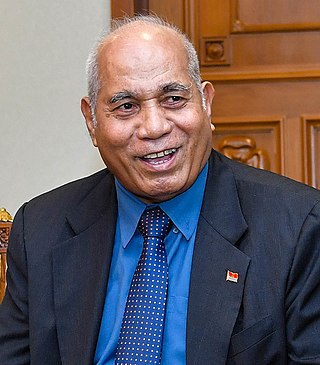
The islands which now form the Republic of Kiribati have been inhabited for at least seven hundred years, and possibly much longer. The initial Austronesian peoples’ population, which remains the overwhelming majority today, was visited by Polynesian and Melanesian invaders before the first European sailors visited the islands in the 17th century. For much of the subsequent period, the main island chain, the Gilbert Islands, was ruled as part of the British Empire. The country gained its independence in 1979 and has since been known as Kiribati.

Ieremia Tienang Tabai is an I-Kiribati politician who served as the first president of Kiribati from 1979 to 1991. He previously served in the equivalent role, chief minister, under the colonial government from 1978 to 1979. Tabai returned to the House of Assembly in 1998 and represented Nonouti as of the 2024 election.

Teatao Teannaki was an I-Kiribati political figure who served as the second president of Kiribati from 1991 until 1994.

Teburoro Tito is an I-Kiribati politician and diplomat who served as the third president of Kiribati from 1994 to 2003.

The House of Assembly is the sole chamber of the Parliament of Kiribati. Since 2016, it has 45 members, 44 elected for a four-year term in 23 single-seat and multi-seat constituencies and 1 non-elected delegate from the Banaban community on Rabi Island in Fiji. From 1979 to 2016, the Attorney general was an ex officio member of the legislature, until a change of the constitution modified this provision.

The Cabinet of Kiribati is the cabinet of the government of the Republic of Kiribati.

Parliamentary elections were held in the Gilbert Islands on 1 February 1978, with a second round on 6 February.

Early parliamentary elections were held in Kiribati on 12 January 1983, with a second round on 19 January. All candidates for the 36 seats ran as independents. Voter turnout was 79.9%.

Parliamentary elections were held in Kiribati on 12 March 1987, with a second round on 19 March. All candidates for the 39 seats ran as independents.

The Gilbert Islands held its first national election to choose a chief minister on 17 March 1978. Opposition leader Ieremia Tabai won with 55.6% of the vote, following a voter turnout of 73.5%. The election for chief minister came after the parliamentary election of the same year and the new parliament's unanimous vote to replace the appointed chief minister with one that was popularly elected.

Presidential elections were held in Kiribati on 17 February 1983. Ieremia Tabai, the incumbent president, won re-election with 49.61% of the vote. Four candidates were chosen from members of parliament. Besides Tabai, these were: vice-president Teatao Teannaki, who was an ally of Tabai, opposition member Tewareka Tentoa, and newly elected opposition member Harry Tong.

Kiribati held a presidential election on 12 May 1987. The incumbent president, Ieremia Tabai, won re-election with 50.1% of the vote. Three candidates were chosen from the members of parliament. Besides Tabai, opposition member Teburoro Tito received 42.7% of the vote, and Tabai's vice-president Teatao Teannaki received 7.2%. The campaign was heavily centred on a controversial deal that Tabai negotiated with the Soviet Union in 1985, which granted the nation fishing rights in the waters around Kiribati. Religion had a significant effect on the political divide, with Protestants generally supporting Tabai's government and Catholics generally supporting the opposition.

Presidential elections were held in Kiribati on 3 July 1991. The result was a victory for Teatao Teannaki, who received 46% of the vote. Voter turnout was 74%.

Taomati T. Iuta was an I-Kiribati politician. He was Speaker of the House of Assembly of Kiribati for the Ninth Parliament (2011–2015). He was the vice president of Kiribati from 1991 to 1994.
Kiribati is a developing island nation consisting in 32 atolls and one raised coral island (Banaba) scattered over some 3.5 million square kilometres in the central Pacific. There is access to national media throughout the country.

Parliamentary elections were held in Kiribati on 30 December 2015, with a second round of voting for 25 seats on 7 January 2016. The result was a victory for the Pillars of Truth party, which won 26 of the 46 seats.
General elections were held in the Gilbert and Ellice Islands on 4 April 1974. All candidates ran as independents.
Ratimiti Babera Kirata (1938-1991) was an I-Kiribati politician, elected in the House of Representatives in 1967 for the constituency of Onotoa. He was nominated candidate to the 1978 Gilbertese Chief Minister election. He was born in Onotoa where he was continuously elected MP from 1978 to his death, dying less than one month before the general election of May 1991. He was at that moment one of the possible candidates to the succession of Ieremia Tabai as the Beretitenti. He was one of the founders and the first president of the Gilbertese National Party and later of the National Progressive Party (Kiribati). He had been continuously member of the Cabinet of Kiribati from 1979 to 1991.

Roniti Teiwaki is an I-Kiribati politician.

Parliamentary elections were held in Kiribati in 2024 to elect members of the Maneaba ni Maungatabu, with the first round held on 14 August and the second round held on 19 August.
















